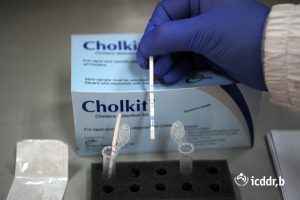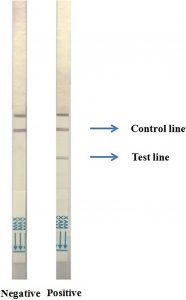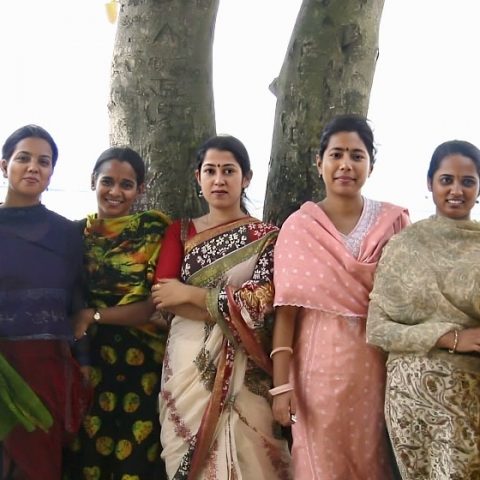A locally-produced dipstick named Cholkit may help in rapid, early and effective diagnosis of cholera in Bangladesh and beyond, suggests new icddr,b findings.

Cholkit is a locally-produced rapid diagnostic test for early detection of cholera. Photo: icddr,b / Incepta Pharmaceuticals
icddr,b scientists in partnership with Incepta Pharmaceuticals have developed the dipstick which went through a rigorous three-year research and development process. Findings from a field evaluation of Cholkit have recently been published in PLOS Neglected Tropical Diseases.
Cholkit is an immunochromatographic test device – a dipstick that is dipped into a tube with stool specimen and provides qualitative result (coloured band) readable by the naked eye within a maximum of 15 minutes’ time.
The rapid diagnostic test (RDT) has shown to successfully meet requirements and guidelines for such tests, which are capable of detecting Vibrio cholerae from stools.
Findings suggest that Cholkit’s sensitivity (76%) and specificity (90%) is similar to the commercially available RDTs showing around 72 percent and 86.8 percent sensitivity and specificity respectively – when used in field settings for detecting V. cholerae from stool specimens.
Dr Firdausi Qadri, senior scientist with icddr,b infectious diseases division, who has led research and development of Cholkit, says, “In addition to laboratory culture of stool samples, imported rapid diagnostic test kits are being used at the moment for cholera detection.
Bangladesh now has a locally-produced RDT Cholkit with potentials to reduce import dependency and create new avenues for export to other endemic countries in the future. Thus Bangladesh will have completed locally-produced cholera preventions tools – a vaccine and a rapid diagnostic test to combat this ancient disease.”

Image: Journal article
The gold standard for detecting cholera is laboratory confirmation by stool culture, which is sensitive to several factors, including the quality of sampling, delays in shipment, laboratory equipment, skilled human resources, time (24 to 72 hours) and cost (USD 6 to 8 per sample).
From the public health perspective, the management of cholera outbreaks need immediate detection as the pathogen has immense potential to spread and cause epidemics in a short period of time. Thus, the need for simple and easy to use RDTs which are quickly interpretable, require simple storage facilities, and are reasonably priced is a clear choice.
It has the potential to be used at the primary health care level for cholera surveillance, for early outbreak detection and as a tool for an initial alert for monitoring of seasonal peaks in highly endemic areas and in peripheral health care facilities.
Burden of Cholera: How might cholkit help?
Cholera is an ancient disease. Globally, an estimated 1.3 billion people are at risk of this disease, with South Asia, constituting the largest share. In Bangladesh, at least 66 million people are at risk of cholera, with nearly 110,000 cases reported annually with many more mild and asymptomatic cases in the community.

icddr,b scientists led research on cholkit. Photo: GMB Akash / icddr,b
The disease is primarily caused by a pathogen called V. cholerae, which has over 200 serotypes. The serogroup O1 and O139 have been reported to be pathogenic and cause cholera epidemics and pandemics. However, in the last decade no epidemics due to V. cholerae O139 have been reported, only sporadic clinical cases have been observed.
“Cholera outbreak management depends on early detection of cases. Historically, all seven cholera pandemics have originated from this part of the world,” says Dr Qadri.
Cholkit is found to be highly efficient in detecting V. cholerae serogroup O1 and has received official licensure, it is priced around USD 3. The Incepta-produced dipstick is now being used in 22 cholera sentinel surveillance sites across Bangladesh which are managed jointly by icddr,b and Institute of Epidemiology Disease Control and Research (IEDCR).

